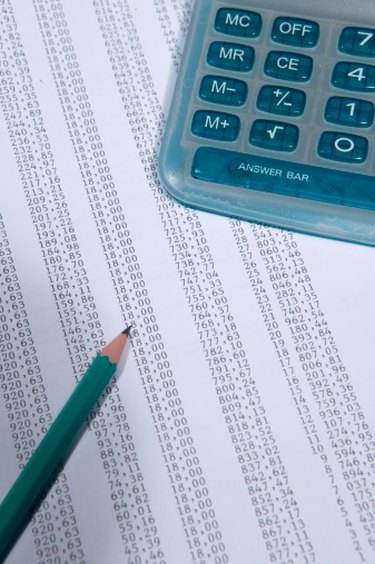
Microsoft Excel, the 25-year-old spreadsheet program that's one of the most frequently used productivity tools on computers, has eight basic elements. The spreadsheets are used to analyze small and large sets of numbers. Excel 2010 lets users analyze a maximum of 1,048,576 rows and 16,384 columns -- a far cry from the 16,384 rows and 256 columns available in Excel's earliest Windows incarnation.
Toolbars, Ribbons and Tabs
Video of the Day
The top of the Excel window includes three basic elements. The "Office" button in the upper left-hand corner contains some of the most common program commands, such as "Save" and "Print." Contextual tabs to the right of the "Office" button are labeled "Home," "Insert," "Page Layout," "Formulas," "Data," "Review," and "View." Each contextual tab includes a "Ribbon," which contains relevant commands. The ribbon on the "Home" tab, for example, includes basic commands for formatting; the ribbon on the "Insert" tab lets you put charts, tables and special objects into your spreadsheet.
Video of the Day
Name and Formula Boxes
The name box in the upper-left hand corner of the spreadsheet, just below the ribbon, indicates the cell where your cursor is located. When you open a spreadsheet, the default location will show "A1," for example. The formula box next to it displays the contents of the cell where your cursor is located. If cell A1, for example, contains the phrase "John Smith," the formula box will display the phrase "John Smith." If the cell contains a formula, even though the cell displays the formula's results, the formula box shows the formula itself.
Rows and Columns
This is the heart of the spreadsheet, where the information is located. Columns are denoted by letters, A through XFD. Rows are referred to by numbers, 1 through 1,048,476. A cell is defined by the intersection of those two parts. For example, the intersection of the third row and second column would be defined as cell B3.
Pages, Layout and Zoom
The lower left-hand corner of the spreadsheet includes tabs for each worksheet in the spreadsheet; the default spreadsheet includes three tabs, labeled "Sheet 1," "Sheet 2," and "Sheet 3." The lower right-hand corner of the spreadsheet contains three layout tabs, allowing you to display the worksheet in different formats, and a zoom slider that lets you magnify or reduce the size of the information on the worksheet.